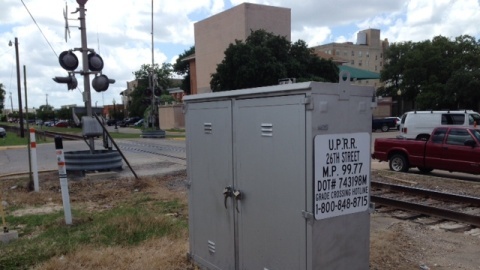
A property dispute involving Union Pacific Railroad is unfolding in Brazos County District Court.
That’s after a Delaware-based company bored a hole under tracks along 26th Street in downtown Bryan, and installed a fiberoptic telephone line without the railroad’s consent.
U-P was granted a temporary injunction this week, banning Fiberlight from similar activity in Brazos County.
Fiberlight argued they ran the line in the public right of way without having to pay the railroad. Fiberlight cited the authority of federal regulations and the Texas Utilities Code, along with the cooperation of the city of Bryan.
District Judge Travis Bryan ruled the railroad “cannot be deprived” of its “constitutionally protected property rights without just compensation” and U-P “has demonstrated a probable right to recovery and a probable injury.”
The judge also wrote Fiberlight’s actions “have caused and will cause”…among other things…” a collision or derailment” and “unscheduled train stoppages”…which could lead to “injury to real and personal property”, “personal injury, or even death.”
Court records show there will be a trial before the judge to consider a permanent injunction and whether any damages will be awarded. A date has not been set.
Fiberlight lawyers wrote their company faces a $5 million dollar penalty in a contract they have with Verizon as the result of U-P’s actions. Fiberlight claims the railroad has caused “unreasonable and excessive delay” and has made “physical threats and threats of imprisonment” to the employees that installed the line west of the courthouse.
Click HERE to read the temporary injunction order.
Click HERE to read the Union Pacific original court filing.
Click HERE to read the reply and counterclaims from Fiberlight.
On May 29, a FiberLight representative sent an e-mail to WTAW News containing the following information:
Because of FiberLight’s public utility certification in Texas (called an SPCOA) FiberLight is allowed to access the public right-of-way throughout the state without additional access requirements. Legally, FiberLight must have any construction plans approved by local authorities, which was done for all relevant sites in Brazos County.
Because Union Pacific does not own the public right-of-way that its facilities are located on, FiberLight is not required by law to seek UP’s consent for work within the public right-of-way.
The temporary restraining order (TRO) referred to in the article was granted by a judge who did not review any evidence relevant to the case outside of Union Pacific’s petition and did not hear from FiberLight at all prior to signing the TRO order. Union Pacific did present its arguments at a hearing, but FiberLight was not present. There was no finding of fact regarding Union Pacific’s claims, thus the judge did not “rule” on anything.
Because there was no finding of fact, there is no evidence to support the claim within the article that FiberLight’s activities “‘have caused’…among other things…‘a collision or derailment’ and ‘unscheduled train stoppages’.” This language was pulled from Union Pacific’s complaint and is not supported by evidence.
Contrary to the above claim, FiberLight’s activities have not caused any collisions, derailments, unscheduled train stoppages, or any other public safety issues.
All of FiberLight’s activities near the Union Pacific facilities have complied with federal, state and local safety laws and regulations.
Following the grant of the TRO identified in your piece, Union Pacific also requested a similar state-wide injunction that would halt FiberLight activities near their facilities state wide. This request was not granted.

